英语高二下北师大版Unit21《Human Biology》(Lesson 2)课件3
文档属性
| 名称 | 英语高二下北师大版Unit21《Human Biology》(Lesson 2)课件3 |
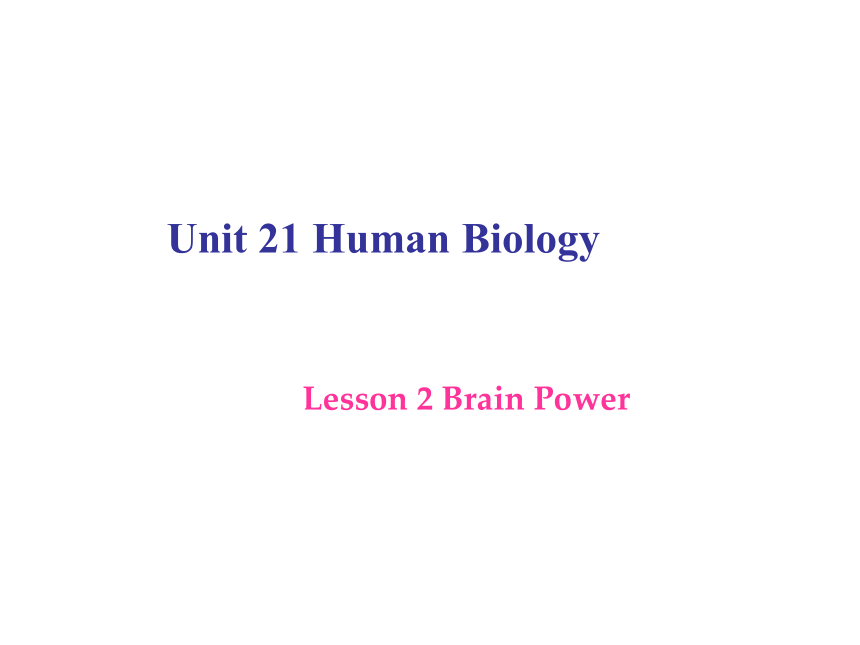
|
|
| 格式 | zip | ||
| 文件大小 | 1.9MB | ||
| 资源类型 | 教案 | ||
| 版本资源 | 北师大版 | ||
| 科目 | 英语 | ||
| 更新时间 | 2013-03-11 00:00:00 | ||
图片预览

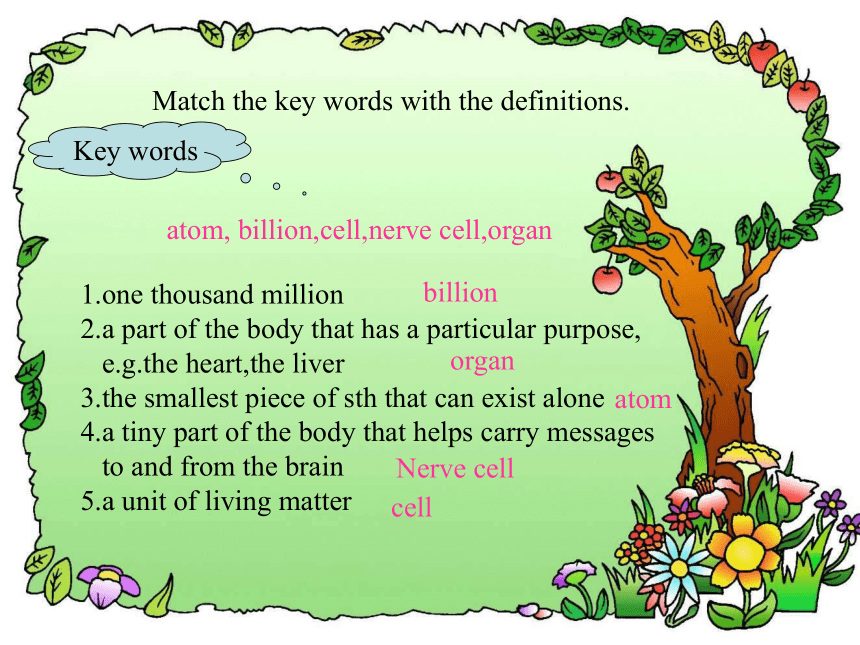
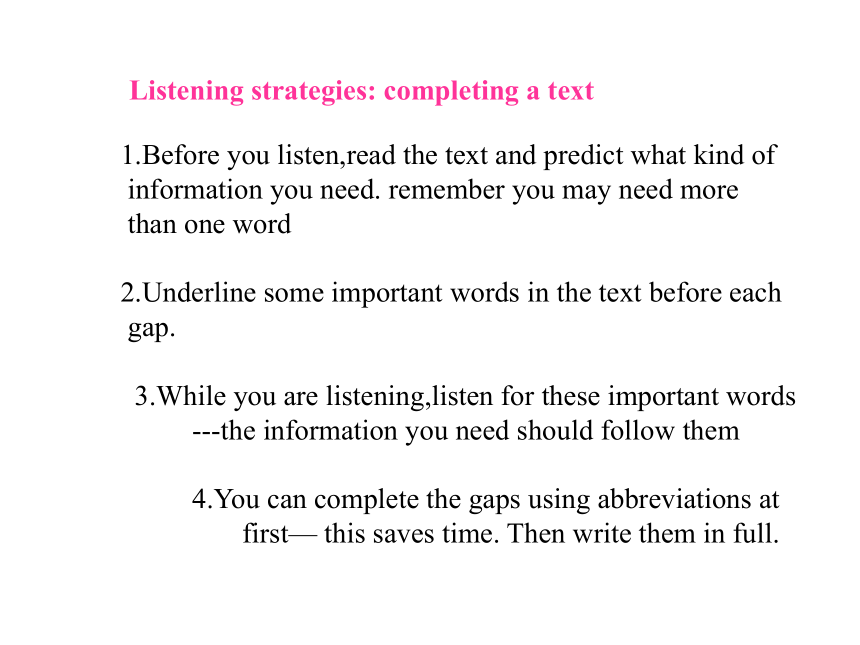
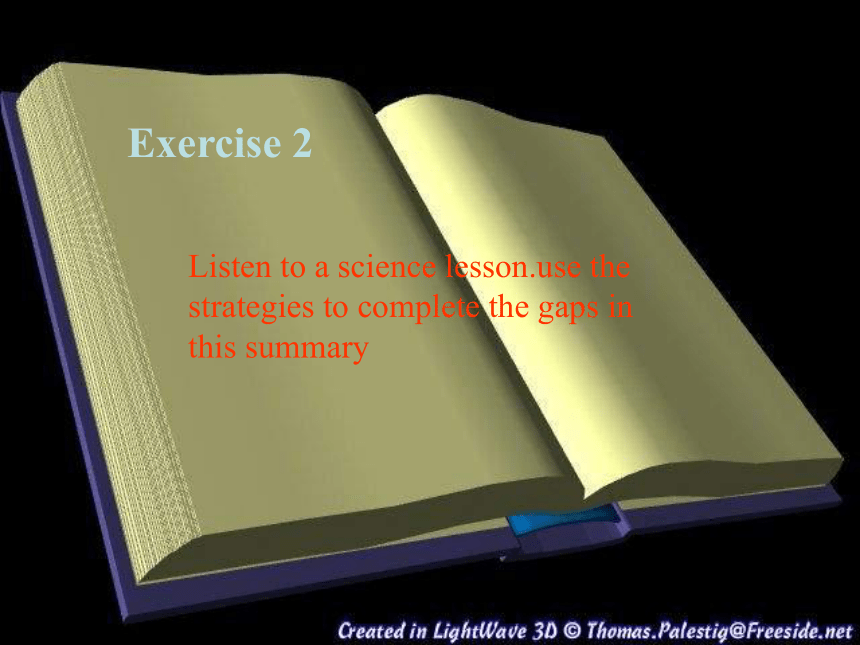
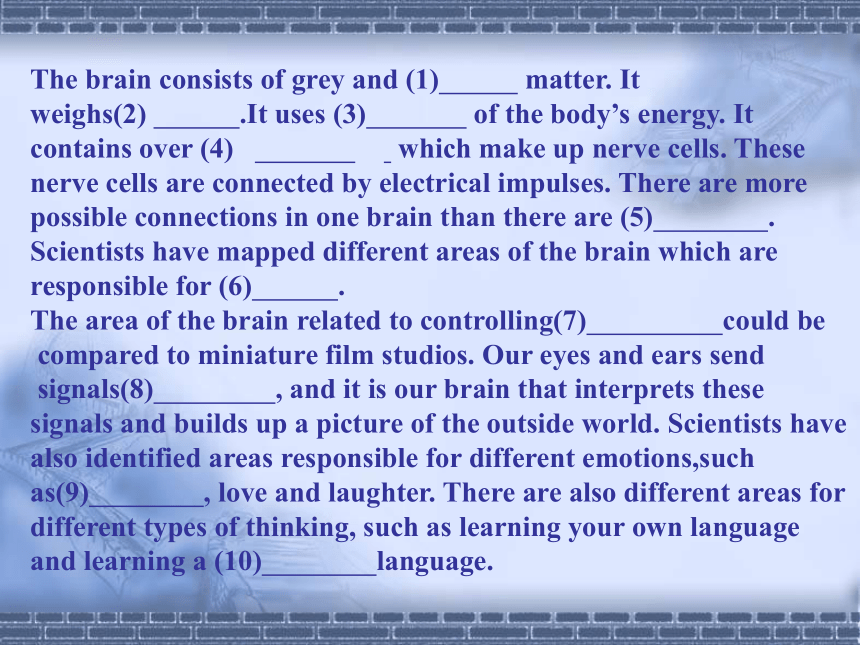

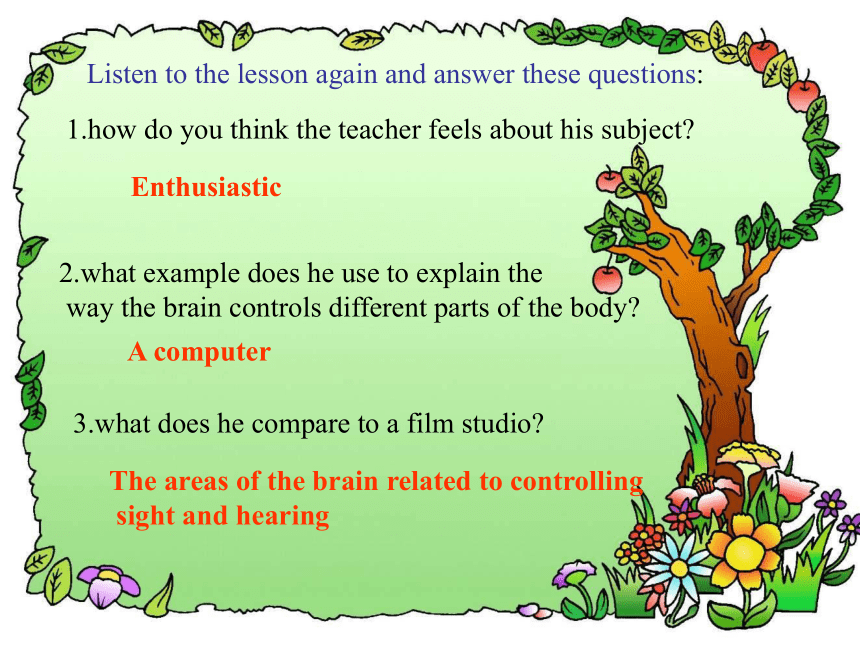


文档简介
课件21张PPT。Unit 21 Human BiologyLesson 2 Brain PowerMatch the key words with the definitions.Key wordsatom, billion,cell,nerve cell,organ1.one thousand million
2.a part of the body that has a particular purpose,
e.g.the heart,the liver
3.the smallest piece of sth that can exist alone
4.a tiny part of the body that helps carry messages
to and from the brain
5.a unit of living matterbillionorgancellNerve cellatomListening strategies: completing a text1.Before you listen,read the text and predict what kind of
information you need. remember you may need more
than one word
2.Underline some important words in the text before each
gap.
3.While you are listening,listen for these important words
---the information you need should follow them
4.You can complete the gaps using abbreviations at
first— this saves time. Then write them in full.Listen to a science lesson.use the
strategies to complete the gaps in
this summary Exercise 2The brain consists of grey and (1) matter. It weighs(2) .It uses (3) of the body’s energy. It contains over (4) which make up nerve cells. These nerve cells are connected by electrical impulses. There are more possible connections in one brain than there are (5) . Scientists have mapped different areas of the brain which are responsible for (6) .
The area of the brain related to controlling(7) could be
compared to miniature film studios. Our eyes and ears send
signals(8) , and it is our brain that interprets these signals and builds up a picture of the outside world. Scientists have also identified areas responsible for different emotions,such as(9) , love and laughter. There are also different areas for different types of thinking, such as learning your own language and learning a (10) language.The answers:(1)white
(2)just over a kilo
(3)20%
(4)100 billion cells
(5)atoms in the universe
(6)different functions
(7)sight and hearing
(8)all the time
(9)fear
(10)foreignListen to the lesson again and answer these questions:1.how do you think the teacher feels about his subject?2.what example does he use to explain the
way the brain controls different parts of the body?3.what does he compare to a film studio?Enthusiastic A computerThe areas of the brain related to controlling
sight and hearingListen to a student phone-in programme
about revising for exams and complete
the table:exercise 4The answers:Exercise 5:listen again and complete the fun_ction file
with these words:Must, mustn’t , ought to, should,
shouldn’t,advise, need to,
if I were you, have got to,could,
there’s no point in, it’s important to,
what tips, can be counter-productive,
whatGiving and asking for advice(1) have you got for me and our listeners?
I think(2) plan your revision.
I think you(3) make a list of all the things you’ve got to study.You(4) work out what your priorities are.
(5) do you think I should do?
(6) ,I’d make sure that I got some exercise.
You(7) get out of the house and get some fresh air.
I think spending hours and hours in the library without a
break(8) .
You(9) drink lots and lots of coffee.
(10) you give me some advice?
You (11) give yourself rewards.
And you(12) give yourself a break.
You(13) just think about the exam all the time.
(14) doing that.
I’d(15) people to watch a good film. The answers:1.what tips
2.it’s important to
3.should
4.need to
5.what
6.if I were you7.ought to
8.can be counter-productive
9.shouldn’t
10.could
11.must
12.have got to
13.mustn’t
14.there’s no point in
15.advise Vocabulary
phrasal verbs Exercise 7 match the words and expressions below with
the verbs n the text(1-11) appear, discover, look at in detail,
make a note of ,
mention, pass, postpone, start,
understandLast month, I had an important English exam.
I decided not to (1)put off studying(as I normally
do!)and got up early every morning to(2)get
down to work straight away. I’m a “morning
person” and (3)got a lot out of my revision.
I always began by(4) going over a practice
test I had done-checking my answers and
(5)finding out what I’d got wrong. I also
tried to
(6)work out why I’d made mistakes. If I didn’t understand sth.,I’d(7)write it
down and then(8)bring it up in class with
my teacher. She was very helpful and she
(9)went through all of the things that would
probably(10)come up in the exam.
In the end,the exam wasn’t so bad
after all and I think I (11) got through
it.Mind you,I still haven’t had my
results yet!!The answers:1.put off----postpone
2.get down to ----start
3.get…out of
4.go over-----look at in detail
5.find out----discover
6.work out----understand
7.write…down---make a note of
8.bring…up----mention
9.go through----look at in detail
10.come up----appear
11.got through----passExercise 8 work in pairs. Discuss these questions:1.What new information have you found out about brains?
2.Which school subject do you get the most out of ?
3.Do you try to work out your English mistakes yourself before you ask your teacher?
4.Do you write down vocabulary lists or just try to remember everything?
5.Do you put off studying for an exam or a test until the night before?
6.Have you ever got through an exam or a test you thought you’d failed?Exercise 1 on page 83 Homework:
2.a part of the body that has a particular purpose,
e.g.the heart,the liver
3.the smallest piece of sth that can exist alone
4.a tiny part of the body that helps carry messages
to and from the brain
5.a unit of living matterbillionorgancellNerve cellatomListening strategies: completing a text1.Before you listen,read the text and predict what kind of
information you need. remember you may need more
than one word
2.Underline some important words in the text before each
gap.
3.While you are listening,listen for these important words
---the information you need should follow them
4.You can complete the gaps using abbreviations at
first— this saves time. Then write them in full.Listen to a science lesson.use the
strategies to complete the gaps in
this summary Exercise 2The brain consists of grey and (1) matter. It weighs(2) .It uses (3) of the body’s energy. It contains over (4) which make up nerve cells. These nerve cells are connected by electrical impulses. There are more possible connections in one brain than there are (5) . Scientists have mapped different areas of the brain which are responsible for (6) .
The area of the brain related to controlling(7) could be
compared to miniature film studios. Our eyes and ears send
signals(8) , and it is our brain that interprets these signals and builds up a picture of the outside world. Scientists have also identified areas responsible for different emotions,such as(9) , love and laughter. There are also different areas for different types of thinking, such as learning your own language and learning a (10) language.The answers:(1)white
(2)just over a kilo
(3)20%
(4)100 billion cells
(5)atoms in the universe
(6)different functions
(7)sight and hearing
(8)all the time
(9)fear
(10)foreignListen to the lesson again and answer these questions:1.how do you think the teacher feels about his subject?2.what example does he use to explain the
way the brain controls different parts of the body?3.what does he compare to a film studio?Enthusiastic A computerThe areas of the brain related to controlling
sight and hearingListen to a student phone-in programme
about revising for exams and complete
the table:exercise 4The answers:Exercise 5:listen again and complete the fun_ction file
with these words:Must, mustn’t , ought to, should,
shouldn’t,advise, need to,
if I were you, have got to,could,
there’s no point in, it’s important to,
what tips, can be counter-productive,
whatGiving and asking for advice(1) have you got for me and our listeners?
I think(2) plan your revision.
I think you(3) make a list of all the things you’ve got to study.You(4) work out what your priorities are.
(5) do you think I should do?
(6) ,I’d make sure that I got some exercise.
You(7) get out of the house and get some fresh air.
I think spending hours and hours in the library without a
break(8) .
You(9) drink lots and lots of coffee.
(10) you give me some advice?
You (11) give yourself rewards.
And you(12) give yourself a break.
You(13) just think about the exam all the time.
(14) doing that.
I’d(15) people to watch a good film. The answers:1.what tips
2.it’s important to
3.should
4.need to
5.what
6.if I were you7.ought to
8.can be counter-productive
9.shouldn’t
10.could
11.must
12.have got to
13.mustn’t
14.there’s no point in
15.advise Vocabulary
phrasal verbs Exercise 7 match the words and expressions below with
the verbs n the text(1-11) appear, discover, look at in detail,
make a note of ,
mention, pass, postpone, start,
understandLast month, I had an important English exam.
I decided not to (1)put off studying(as I normally
do!)and got up early every morning to(2)get
down to work straight away. I’m a “morning
person” and (3)got a lot out of my revision.
I always began by(4) going over a practice
test I had done-checking my answers and
(5)finding out what I’d got wrong. I also
tried to
(6)work out why I’d made mistakes. If I didn’t understand sth.,I’d(7)write it
down and then(8)bring it up in class with
my teacher. She was very helpful and she
(9)went through all of the things that would
probably(10)come up in the exam.
In the end,the exam wasn’t so bad
after all and I think I (11) got through
it.Mind you,I still haven’t had my
results yet!!The answers:1.put off----postpone
2.get down to ----start
3.get…out of
4.go over-----look at in detail
5.find out----discover
6.work out----understand
7.write…down---make a note of
8.bring…up----mention
9.go through----look at in detail
10.come up----appear
11.got through----passExercise 8 work in pairs. Discuss these questions:1.What new information have you found out about brains?
2.Which school subject do you get the most out of ?
3.Do you try to work out your English mistakes yourself before you ask your teacher?
4.Do you write down vocabulary lists or just try to remember everything?
5.Do you put off studying for an exam or a test until the night before?
6.Have you ever got through an exam or a test you thought you’d failed?Exercise 1 on page 83 Homework:
